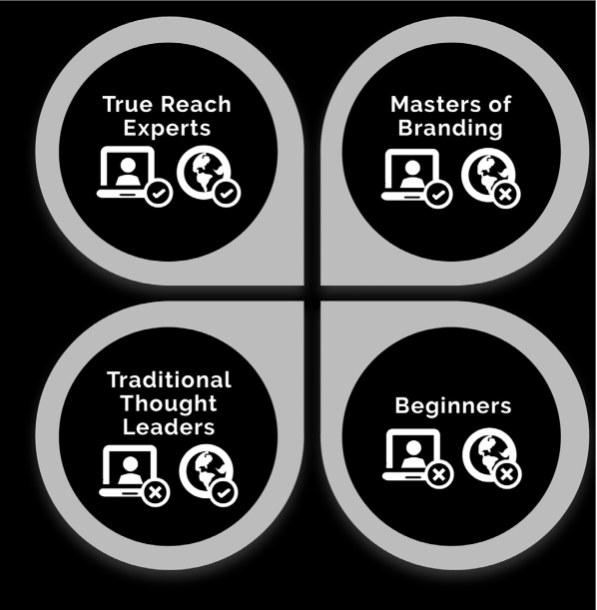
Today’s post is an excerpt adapted from Reach: Create the Biggest Possible Audience for Your Message, Book, or Cause by Becky Robinson (@beckyrbnsn).
In my work with clients over the years, I’ve identified a significant gap that even very successful people must overcome to create reach. It’s the difference between how a person shows up online and how they show up offline.
Most people naturally invest more time, energy, and resources in their offline lives. However, an exclusive focus on offline life will almost always limit reach.
The only way to create the biggest reach possible for your work is to grow your contributions online and offline simultaneously. Whatever you do, do it out loud, sharing the story of your work publicly so people can learn and benefit from your work even if they don’t know you offline. Those who are on a journey with the goal of creating more impact need to maximize both their offline contributions and their online presence over time to reach more people. They need to share the value of their work both online and offline.
During my twelve years of working with people to increase the reach of their messages, I’ve identified four levels of expertise related to creating an online presence. Each circle includes a globe icon (representing offline influence) and a computer screen icon (representing online influence).

Someone who has neither online nor offline influence is a beginner. Note that in the beginner circle, both the globe icon and the computer screen icon are marked with an X, which indicates that both online and offline influence are absent.
Someone who has influence online but not offline is a master of branding. In this circle, the globe icon is marked with an X, indicating that people in this category do not have offline influence.
Someone who has offline influence that is not fully represented online is a traditional thought leader. In this circle, the icon for online influence is marked with an X.
The fourth circle depicts true reach experts, the people who show up online in the same powerful way that they show up in real life. People in this group are positioned to create the biggest possible audience and lasting impact for their work.
If you are at the start of your career or at the start of creating traction for an idea, message, book, or cause, you likely are in the category of beginner. You could also call yourself a beginning beginner. You have neither recognition offline nor impact online…yet. You’re figuring out your brand position in life or figuring out your career journey. Or you’ve been in a career and you’re making a switch but have little experience related to your aspirations.
There’s no shame in being here. Instead of being overwhelmed about all that lies ahead, be inspired by the vision of what you can accomplish. There’s nowhere to go but up. Patience will be helpful on this journey, since starting to grow influence online is like planting a tree; it may be years before you enjoy the shade.
Everyone who is starting something new is in this group. In 2009, when I joined Facebook for the first time, I was in this category. I had stepped out of a job in a nonprofit organization when I had my first child in 2001. I didn’t have a specific career vision and I didn’t have any expertise to add to a topic or to a vision of where I could contribute. Even though I was approaching age 40, it would not have been a stretch to call me a beginning beginner.
It can be humbling to be in this place. After I started to take some freelance writing gigs, one of my clients approached me and asked me to write a leadership blog in support of the university’s online leadership degree programs. He framed the request like this: “How would you feel about writing a blog about a topic you know nothing about?” The topic? Leadership.
I remember feeling annoyed. I told my client about my role as president of our condo association, the preschool co-op I had started, and the church I had partnered with my husband to start. “I know about leadership,” I told him. But I really didn’t. I had to start at the beginning. I had neither expertise to offer in the real world nor anything meaningful to say online. I had to work to create both at the same time.
Discover your value
After I entered online spaces in 2009, I acquired more learning about leadership by teaching one semester of undergraduate courses in leadership for an online program. This short stint gave me some additional credibility, but only a thin veneer.
Along the way, I began experimenting with and learning about social media marketing. In my freelance work for the university, I started and grew a Twitter account, then started managing Facebook pages. At the time, we were all learning about social media together and I learned a lot by exploration and experimentation. Increasing my expertise about social media proved to be much easier than increasing my learning about leadership. I had so much catching up to do about being a leader.
When I started my own blog in 2010, my path as a digital marketing professional was still not yet clear. I envisioned writing about several topics: leadership, relational connections, and social media. I had to experiment with topics in my online writing and posting until I had enough experience to see the path forward. I discovered along the way what topics excited me, what topics interested the people who read my work, and where I could make my most meaningful contribution, including how I could carve out a profitable and purposeful business.
Newcomers in online spaces can experiment with content first. They can learn from experience to clarify and hone in on how they can best contribute value.
Add consistency
It will be impossible to create significance offline or online without consistency. Once you’ve identified how you will bring value, start contributing it consistently. So many people who start to build an online presence give up before they have a chance to break through to widespread success.
Settle in
As you are getting started, patience is imperative. Without patience, you will not sustain your contributions long enough to create reach.
Humility at the start may give you some early momentum. If you are just getting started, own it. Tell people “I’m new here. I’m just getting started.”
When I started blogging about leadership in 2009, I spent a lot of time seeking out other leadership bloggers. Early on, I developed a friendship with several bloggers who’d been on the scene longer than me. I soon discovered that most of them had significantly more expertise than I did that added credibility to their contributions on leadership. I asked a lot of questions. I listened to and acted on their advice.
While I was establishing my brand, I had to ask for help—often. I remember an early win in May 2009. The blog I wrote at the time had been going for a few months. So I decided to reach out to Dan McCarthy, blogger at Great Leadership by Dan, to ask him to host a guest article. When he responded favorably, I danced and shrieked around my house. I had no idea how these humble beginnings would lead to my discovery of a powerful new career.
When you are just getting started and can ask for help and humbly learn from others, you can fuel ongoing collaborative relationships. People will want to be helpful and will appreciate the opportunity to guide your journey. Starting strong will increase your chances of sticking around long enough to make an impact.
Be generous
One of the benefits of being a beginning beginner is that you are probably showing up in online spaces without an urgent agenda apart from learning and contributing. Because of this, you may have more time, energy, and willingness to promote others and their work. As a newcomer to online conversations on a certain topic, you can attract attention by amplifying the work and ideas of other people.
In this beginning stage and throughout your journey, be as generous as you can. Link to other people’s work, quote other people, participate in promoting others’ books or causes, write reviews of people’s books. If you’ve learned from someone, acknowledge their contribution. If you admire someone, shout it out.
Whether you are a beginning beginner as I was in 2009 or a traditional thought leader with decades of contributions offline, you will create the biggest audience and most lasting impact with your work if you choose to close the gap between who you are offline and who you are online by showing up with consistent value on your core topics.

Becky Robinson is the Founder and CEO of Weaving Influence, a full-service marketing agency that specializes in digital and integrated marketing services and public relations for book authors, including business leaders, coaches, trainers, speakers, and thought leaders. Since launching more than a decade ago, under Becky’s leadership, the firm has helped clients launch more than 160 books, enabling authors to build their brands, acquire more business customers, and increase book sales.
In April 2022, Becky published her first book with Berrett-Koehler Publishers titled, Reach: Create the Biggest Possible Audience for Your Message, Book, or Cause. A bonus chapter of the book, Spend This First, which shares how authors should begin their book promotion, is available at no cost by clicking here.

